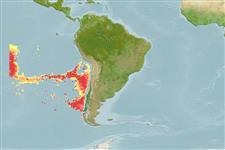Teleostei (teleosts) >
Acropomatiformes (Oceanic basses) >
Symphysanodontidae (Slopefishes)
Etymology: Symphysanodon: Greek, syn, symphysis = grown together + Greek, physis = growth body form + Greek, odous = teeth; related to few teeth which are located over the area where the two jaws meet (Ref. 45335); parini: Named for N.V. Parin of the P. P. Shirshov Institute of Oceanology, Moscow, who provided the material on which the description is based and who has been of invaluable assistance to them and other ichthyologists for m.
Environment: milieu / climate zone / depth range / distribution range
Ecology
Marine; pelagic-oceanic; depth range 240 - 275 m (Ref. 54833). Tropical
Southeastern Pacific: known only from the Sala y Gómez Ridge.
Size / Weight / Age
Maturity: Lm ? range ? - ? cm
Max length : 11.4 cm SL male/unsexed; (Ref. 54833)
Short description
Identification keys | Morphology | Morphometrics
Dorsal spines (total): 9; Dorsal soft rays (total): 9 - 10; Anal spines: 3; Anal soft rays: 7; Vertebrae: 25. This species is distinguished from all other species of the genus, except S. maunaloae, by the following combination of characters: segmented rays in anal fin 7, tubed lateral-line scales 45-50, total gillrakers on first gill arch 31-34 (9 or 10 + 22-24), sum of lateral-line scales and gillrakers on individual specimens 77-84, depth of body 22.5-24.7 % SL (4.0–4.4 times in SL), length of depressed anal fin 24.8-26.4 % SL, hypurals 1 & 2 autogenous, hypurals 3 & 4 represented by a single plate, and first caudal vertebra without parapophyses. It can be separated from S. maunaloae by differences in mean numbers of tubed lateral-line scales (mean = 47.89 for S. parini vs. mean = 44.94 for S. maunaloae; and pectoral-fin rays (mean = 16.90 for S. parini vs. mean = 16.13 for S. maunaloae; and by differences in certain morphometric characters.
Life cycle and mating behavior
Maturities | Reproduction | Spawnings | Egg(s) | Fecundities | Larvae
Anderson, W.D. and V.G. Springer, 2005. Review of the perciform fish genus Symphysanodon Bleeker (Symphysanodontidae), with descriptions of three new species, S. mona, S. parini, and S. rhax. Zootaxa 996(1):1-44. (Ref. 54833)
IUCN Red List Status (Ref. 130435)
Threat to humans
Harmless
Human uses
Tools
Special reports
Download XML
Internet sources
Estimates based on models
Phylogenetic diversity index (Ref.
82804): PD
50 = 0.5004 [Uniqueness, from 0.5 = low to 2.0 = high].
Bayesian length-weight: a=0.01000 (0.00244 - 0.04107), b=3.04 (2.81 - 3.27), in cm total length, based on all LWR estimates for this body shape (Ref.
93245).
Trophic level (Ref.
69278): 3.4 ±0.4 se; based on size and trophs of closest relatives
Fishing Vulnerability (Ref.
59153): Low vulnerability (10 of 100).
